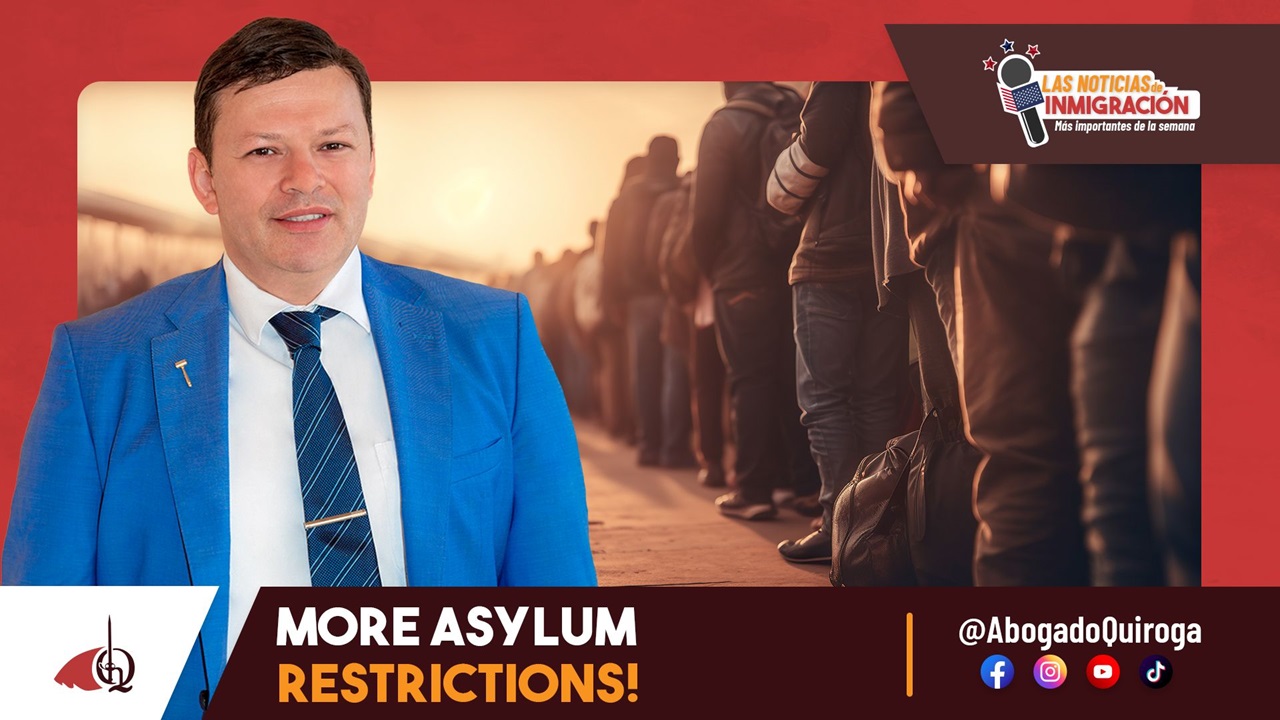Executive Order Restricts Asylum Requests at the Southern Border
My brave ones! Once again, I’m here bringing you the best summary of the topics that I believe are the most relevant this week and of interest to our immigrant community.
Let’s start and don’t miss this important information!
New Restrictions on Asylum Seekers at the Southern Border
This Tuesday, President Joe Biden signed an executive order that limits asylum for those crossing the southern border irregularly. The measure sets a daily limit of 2,500 people. If this limit is exceeded, asylum will be denied to non-citizens entering without authorization. Additionally, those crossing the border after the limit is exceeded will be subject to expedited deportation.
The executive order took effect immediately and aims to address the high number of asylum seekers that are regularly reached. However, these restrictions are temporary and will be lifted if the average number of irregular crossings drops below 1,500 for seven consecutive days.
Key Points:
- Republicans criticize the order as insufficient.
- Democrats and pro-immigrant groups see it as too harsh.
- The administration considers it crucial for border security.
Therefore, experts and migrant advocates call for a comprehensive immigration reform that offers a path to permanent residency for asylum seekers.
Read also: Immigration Reform Fails Again – What Happened?
Arizona Voters to Decide the Future of Controversial Law Criminalizing Migrants
With 31 votes in favor and 29 against, The Arizona House of Representatives approved putting bill HCR2060 to a vote by the citizens. Remember that this proposal makes crossing the border without documents a state crime. With this move, Republicans seek to have the people approve or reject the law after it was vetoed by the state’s governor, Katie Hobbs, in April.
Republican legislator Joseph Chaplik defended the need for this law, arguing that it would protect communities from serious crimes committed by some migrants.
HCR2060 will give state and local authorities the power to question and arrest people suspected of not having valid immigration documents. It will also require verification of immigration status when applying for public benefits. Additionally, it grants immunity to police departments during its enforcement.
Finally, critics warned that the rule could foster racial profiling and discrimination, comparing it to the controversial SB1070 law of 2010, which triggered boycotts and massive protests.
You might be interested in: New Wave of Immigration Legislation in the United States Affects Several States
House of Representatives Proposes Budget for DHS with New Priorities
The House Appropriations Committee presented a $64 billion bill to fund DHS for the fiscal year 2025. This bill would allocate $10.5 billion to CBP and $4 billion to fund ICE’s migrant detention centers. This is estimated to provide a daily occupancy of 50,000 beds. Lastly, $600 million dollars were allocated for the border wall, among other significant investments.
Funds would also be allocated for transportation and removal operations and national security investigations. The bill also includes restrictions on certain immigration policies implemented by the Biden administration.
The proposal seeks to prioritize border security and improve detention and removal operations. Critics argue it could have a negative impact on the immigrant community.
We will be watching what happens with the bill, as its approval would significantly impact the immigrant community.
Also, you might read: USCIS Expands Work Permits for 800,000 Immigrants
Litigation Advances Against Anti-Immigrant Law SF2340 in Iowa
This week, court hearings were held for lawsuits against the SF2340 law, which criminalizes the presence of previously deported non-citizens. Remember that the Department of Justice and immigrant advocacy groups previously attacked this law.
Iowa argued that it does not infringe on federal authority and adheres to Supreme Court precedents, citing the federal crime of “unauthorized reentry.”
On the other hand, plaintiffs claimed the law violates the Constitution and disrupts the federal immigration system. This litigation is crucial, and we will continue to monitor its development.
In summary, SF2340:
- Criminalizes the presence of deported non-citizens.
- Was attacked by the Department of Justice and immigrant advocates.
- Iowa defends it does not infringe federal authority.
- Plaintiffs allege constitutional violations.
The resolution of this case will significantly impact immigration policy and the immigrant community. We will keep you informed of the updates.
You might also read: Significant Advancement in U.S. Immigration Policy
La Lupa Electoral – Duel on TikTok: Trump Joins the Network, While Biden Struggles to Boost His Image
While Biden’s re-election campaign uses social media to win voters, his latest TikTok videos have received much criticism. Focused on the economy, inflation, and the high cost of living, these comments are counterproductive for his campaign, turning it into a double-edged sword.
Surprisingly, in a turnaround, Trump joined TikTok, the same platform he tried to ban during his presidency. His campaign reported that this is an effort to connect with the younger audience. Quickly, the former president’s account accumulated followers, surpassing 5 million compared to Biden’s campaign’s 360,000.
The presidential campaign intensifies as November approaches, and social media becomes a new electoral battleground. While Biden faces challenges in turning attention into support due to current concerns, Trump capitalizes on his celebrity image to quickly gain followers.
Remember, promises evaporate, actions do not. Act now.
If you need advice to regularize your immigration status, contact us; we are here to help you.
You might be interested in this video: What Happens if a Candidate Continues in the Electoral Race?
This was the most important immigration news of the week. See you next Friday.
Stay informed of the latest happenings in immigration, proposals, laws, changes, and benefits for our immigrant community.
Do you know someone who might benefit from this information? Share it, they will thank you.



